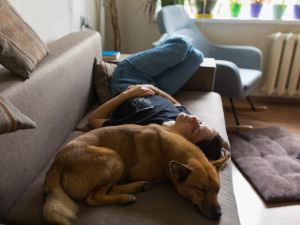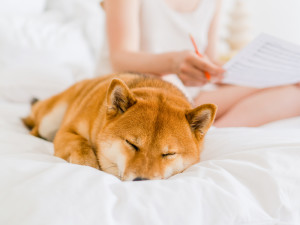Why Is Your Dog Barking in Their Sleep? Should You Be Concerned, or Is This Normal?
Learn the difference between when it’s cute and when it’s troubling.

Share Article
In This Article:
Understanding Dog Sleep Behavioropens in a new tab Why Do Dogs Bark in Their Sleep?opens in a new tab Common Triggers for Sleep Barkingopens in a new tab What to Do if Your Dog Barks in Their Sleepopens in a new tab
When you hear your dog barking in their sleep, you probably think it’s cute and endearing. But you’re probably also wondering why this is happening. Is the barking just a normal part of a dog’s sleep, or is it cause for concern? In this article, we dive deep into why your dog may bark in their sleep and offer guidance about what to do (or not do) when it happens.

littleKin™ is Kinship’s home just for puppy and kitten parents. Bop over to check out expert advice, new pet tools, and special deals—all curated for your newest family member.
opens in a new tabUnderstanding dog sleep behavior
Dogs have different stages of sleep, just like people. There’s deep sleep, light sleep, and rapid eye movement (REM) sleep. Vocalizing, twitching, and paddling their legs most commonly occur during a dog’s REM sleep.
Each sleep stage has its purpose. Dogs stay semi-alert during light sleep and can be easily awakened. This stage is essential for transitioning into deeper-sleep phases. Deep sleep is when physical recovery occurs, allowing muscles and tissues to repair themselves. REM sleep, which includes rapid eye movements and dreaming, is when mental repair occurs.
Understanding these stages, and how they impact your dog’s behaviors during them, will help you determine if there is a need for concern.
Why do dogs bark in their sleep?
Your dog may bark in their sleep for a few different reasons.
Instinct
It is in dogs’ nature to be vocal. They have an instinct to communicate, and that instinct doesn’t turn off just because they’re asleep. Their vocalizations are probably arising out of a need to warn others about potential threats or to interact with their environment. Ancestral wolves and wild dogs communicated with other pack members by vocalizing, which is still deeply embedded in modern domestic dogs.
REM sleep and dreaming
Surprisingly enough, dogs also dream. Dreaming occurs during REM sleep. Humans tend to dream about real-life experiences that happened during the day, and dogs do that, too. Dogs probably dream about chasing squirrels, playing fetch, or meeting other dogs at the park. They are barking while replaying their actions from an earlier time. This is generally harmless.
In people, REM sleep is believed to be a way of processing emotions and consolidating memories. This is thought to be the case for dogs as well. So barking during REM sleep is generally harmless and even helpful.
Common triggers for sleep barking
Past experiences and memories
So, what do dogs dream about? We mentioned chasing squirrels or meeting friends in the park. That may be true for happy dogs. But what about dogs who have been traumatized? A rescue dog may dream about bad times in their past, which may make them vocalize. This is an example of how understanding your dog’s past can help you interpret what your pup’s vocalizations mean. For the rescue dog, barking could indicate stress or fear. This discovery could lead you to provide even more of a nurturing environment to help reduce the episodes of fearful barking during sleep.
Environmental stimuli
If a dog’s senses remain somewhat alert during sleep, external noises like a car horn or distant siren can trigger a dreaming dog to bark. Therefore, creating a calm and quiet sleeping environment to the best of your ability can help minimize these triggers. Turning on a white noise machine or placing your dog’s bed in a quiet room can decrease the chance of environmental stimuli affecting your pup’s dreams.
What should you do if your dog barks in their sleep?
Dog barking during sleep is usually perfectly normal. It generally occurs during the REM sleep phase and reflects your dog reliving events from their day. However, surprisingly enough, dogs do get sleep disorders that require medical intervention.
Determine if there are any signs of a sleep disorder
Occasional barking during sleep is perfectly normal for dogs. However, excessive or disruptive behaviors may indicate a sleep disorder. Yes, dogs get them, too. Dogs can have narcolepsy or REM behavior disorder that requires a veterinarian’s help.
Dog narcolepsy is a rare neurological disorder that causes a dog to be excessively sleepy during the day or have periods of muscle weakness. Certain factors, such as excitement, stress, or play, can trigger the episodes. The disorder in dogs is usually genetic. Affected breeds include Doberman Pinschers, Labrador Retrievers, and Dachshunds.
Meanwhile, dogs with REM behavior disorder act out their dreams during the REM stage of sleep. They may move intensely while sleeping or even seem to be chasing something. If a vet suspects the pup could harm themself, the dog may be prescribed medication.
These conditions are rare but watch for unusual movements, frequent interruptions to your dog’s sleep, and prolonged barking or whining. Keep a sleep diary that records your dog’s behavior, noting the frequency and intensity of their sleep barking and other symptoms during the night. If your dog seems distressed or tired despite sleeping, it might be time to see the veterinarian.
When to consult a vet
If your dog has a sleep disorder, there will be other symptoms, such as:
Difficulty waking
Excessive daytime lethargy
Signs of pain
Unusual movement during sleep
Frequent interruptions to their sleep
Prolonged barking or whining
If your dog has any of these symptoms, it’s time to consult a vet. A professional can look for signs of seizures, sleep apnea, or other health problems. They can also recommend tests such as a neurological exam or sleep study. Early detection is always best, so treatment can be started as early as possible for a better outcome.
Bottom line
If your dog barks occasionally during sleep, this is usually normal, harmless behavior. Your pup is probably enjoying a healthy dream cycle.
To promote healthy sleep, create a restful, quiet sleep environment for your dog.
Also, maintain regular vet appointments to keep up with your dog’s overall health and well-being.
Finally, keep a watchful eye, and visit your vet if anything seems unusual.
References
Adams, G.J., and K.G. Johnson. “Sleep-Wake Cycles and Other Night-Time Behaviours of the Domestic Dog Canis Familiaris.” Applied Animal Behaviour Science, vol. 36, no. 2-3, Apr. 1993, pp. 233–248, https://doi.org/10.1016/0168-1591(93)90013-fopens in a new tab.
Bódizs, Róbert, et al. “Sleep in the Dog: Comparative, Behavioral and Translational Relevance.” Current Opinion in Behavioral Sciences, vol. 33, June 2020, pp. 25–33, www.sciencedirect.com/science/article/pii/S2352154619301378opens in a new tab, https://doi.org/10.1016/j.cobeha.2019.12.006opens in a new tab.
Kinsman, Rachel, et al. “Sleep Duration and Behaviours: A Descriptive Analysis of a Cohort of Dogs up to 12 Months of Age.” Animals, vol. 10, no. 7, 10 July 2020, p. 1172, https://doi.org/10.3390/ani10071172opens in a new tab.

Dr. Shelby Neely, DVM
Dr. Shelby Neely is a freelance writer and veterinarian who graduated from The University of Pennsylvania and has practiced veterinary medicine for 30 years. She has found homes for hundreds of stray pets and has two cats as well as four grand-dogs and two grand-cats. In her spare time, Dr. Neely likes to be with her three children, their dogs and cats, and her own two cats. She also likes to see as many Broadway shows as possible.
Related articles
![Dog barking]() opens in a new tab
opens in a new tabHow to Stop Your Dog From Barking
The top five reasons dogs bark—and how to get them to relax a bit.
![Wiener dog barking out of window of blue truck]() opens in a new tab
opens in a new tabWhy Do Dogs Bark in the Car?
What to do when your dog barks at everything from other cars to people.
![Woman wearing a black t-shirt and jeans laying on the couch with her dog taking a nap]() opens in a new tab
opens in a new tabWhat Are the Effects of Sleeping With Your Dog in Bed?
There are pros and cons of sleeping with your dog — for both of you.
![Shiba inu dog sleeping in bed]() opens in a new tab
opens in a new tabMy Dog Sleeps All Day—Is That Normal?
Dogs need more sleep than humans. Here’s how much is healthy.





